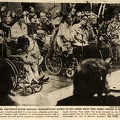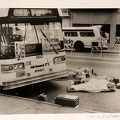Denver Post
[This article goes with photo in ADAPT 89]
[Headline] Wheel Chair Delegation Accuses Board of Ignoring Them
Howard Pankratz, Denver Post Staff Writer
A 17-year-old crippled girl Tuesday told the board of the Regional Transportation District (RTD) it cost nine handicapped adults in wheelchairs $90 to take a four-mile trip to a Denver Bears baseball game at Mile High Stadium last summer.
Her testimony and that of other Denver handicapped individuals highlighted a public meeting at which the RTD was accused of not caring about the handicapped and elderly.
By the time the meeting ended board members voted not only to intensify their efforts to help the handicapped but to do everything in their power to see that 120 new buses the RTD hopes to buy have facilities for the elderly and impaired.
The board authorized chairman John Fleming Kelly, to file an application with the U.S. Department of Transportation (DOT) for a $12.4 million grant to finance purchase of the 120 buses; and to build a new bus administration and maintenance facility and 100 bus shelters.
At the meeting at the Colorado Highway Department building, it was obvious the board was moved by the presence of approximately 40 persons in wheelchairs, some who accused board members of not being “sincere” in their efforts to help the handicapped.
[Subheading] NOT SURE OF CARE
“I want to make sure we take care of these people,” board member Leo F. Sullivan, declared near the close of the session. “From the remarks I've heard tonight, I'm not sure we are."
John Harper, another board member, assured the group that the RTD is sincere but he acknowledged that he thought maybe the RTD might have been a "bit-remiss" in regard to the handicapped and “could do a better job."
The most moving testimony of the night came when Inez Regge, severely crippled and confined to a wheelchair, told of how nine adults from the Heritage Nursing Home had to pay $10 each to attend the ball game.
“That is high by any standard, but for these young people whose total income was approximately $20 a month, it was exorbitant," she said. “There have been similar ‘rip offs’ in the past, including a $92 fare for one young man going from Heritage House downtown-and back."
She said not all private companies who provide such services to Denver's handicapped are “mercenary,” but overhead forces them to keep their rates high. Until Sept. 7, the day Denverites approved the RTD bond issue, she said “there didn't appear to be any transportation alternatives for most of Denver's disabled.
[Subheading] COMMITMENT SOUGHT
But she said that a commitment by RTD officials prior to the bond election to provide bus service to the handicapped, plus a provision in the Federal Transportation Act which says special effort must be made to accommodate the handicapped on mass transportation, gave them an alternative.
Miss Regge said Denver has one of the highest percentage of handicapped people in the country because of the large number of facilities here.
“It is the goal of the handicapped community to see to it
that all public transportation is accessible to the handicapped," she said.
John D. Simpson, RTD executive director, said RTD had hired Al Coulter of the Denver Board for the Mentally-Retarded and Seriously Handicapped, Inc., to try to find out about the transportation needs of the region's elderly and handicapped.
But he said RTD and Coulter had run into a business community which had refused to give the agency help in locating the handicapped.
“We have been unable to ascertain where handicapped people want to travel to and from,” Simpson said. “There is some real difficulty in talking to companies — and we have approached half a dozen of the major employers - who have handicapped employees.
“They either say ‘We don't know who they are' or ,‘We do know, but we don't want to tell you.'"
Les Berkowitz, representing the Citizens Advisory Committee on Transportation for the Handicapped, reminded the RTD that not only does the organization have a moral and philosophical obligation to the handicapped, but also a “specific, expressed requirement” under federal statute.
He quoted a public law which directs “that special efforts shall be made in the planning and design of mass transportation facilities and services so that the availability to elderly and handicapped persons of mass transportation which they can effectively utilize will be
assured."
Berkowitz, sitting in a wheelchair a few feet away from the 15 board members, said despite RTD assurance it is interested in the handicapped. “we have some reason to believe that RTD is not entirely sincere in its efforts."
Although seeking assistance from a citizen’s task force, he said RTD has expected from that task force, composed entirely of volunteers, “far more than we can be reasonably expected to give.”
He said the volunteers have had little or no training in the collection of data or research design. Further, he alleged that Coulter had only been hired for a 60-day period.
While Denver's handicapped community asked that the RTD do more, a wide variety of spokesmen enthusiastically backed RTD's $12.4 million federal government application.
They said the buses which the money would buy would do everything from helping alleviate Denver's air pollution problem to providing a badly needed form of economical transportation.
State Rep. Richard Lamm, D-Denver, said that after Denver “won the dubious distinction as one of the nation's six most polluted cities.” the Colorado legislature created RTD and charged it with developing a transit plan.
“Tonight we are here to publicly discuss the first and a vital phase of this plan -- the early action bus program,” he said. “RTD will be able to improve bus service by more than 60 percent in the region with this one capital grant alone. That, to me, is an important first step toward cleaning up the environment."
Gordon Appell, principal planner for the Denver planning office, read a statement by Mayor Bill McNichols in which McNichols said the demand for public transit in the Denver area “has reached almost emergency proportions."
McNichols noted that in January, the Denver Metro Transit system had 1.9 million passengers, a 22 per cent increase over the same month a year ago. He forecast that the number of passengers may exceed 25 million this year. Thus, he said, the money for the buses is imperative.
- Created on
- Wednesday 10 July 2013
- Posted on
- Tuesday 10 May 2016
- Tags
- accessible transit, bus purchase, caring, crippled, Denver RTD, DOT - Dept of Transportation, funding, Gordon Appell, Heritage House, Inez Regge, Les Berkowitz, Mayor McNichols, private transit, public hearing, Richard Lamm - state rep
- Albums
- Visits
- 3472
- Rating score
- 4.87 (2 rates)
- Rate this photo


0 comments